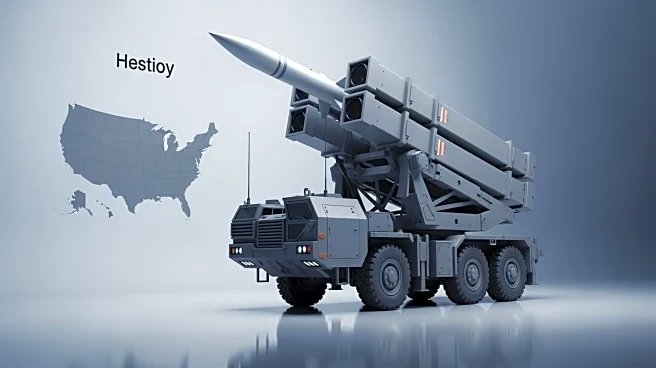What's Happening?
President Trump recently reconsidered his proposal to sell long-range Tomahawk missiles to Ukraine, citing concerns about depleting the U.S. arsenal. This decision came during a meeting with Ukrainian
President Volodymyr Zelensky at the White House. Zelensky was seeking increased military support from the U.S. following Trump's success in brokering a ceasefire between Israel and Hamas. During the meeting, Zelensky offered to assist the U.S. in producing more armed drones in exchange for the missiles, which could strike deep into Russian territory. Trump expressed reservations, suggesting that providing such weapons could escalate the conflict. His hesitation followed a phone call with Russian President Vladimir Putin, where Trump discussed the potential sale. Despite previous openness to the idea, Trump now appears cautious, especially after a summit with Putin in Alaska failed to yield significant progress.
Why It's Important?
The potential sale of Tomahawk missiles to Ukraine is significant as it could alter the balance of power in the ongoing conflict with Russia. For Ukraine, acquiring these advanced weapons would enhance its military capabilities and potentially pressure Russia into negotiations. However, Trump's reluctance reflects broader concerns about escalating tensions and the impact on U.S. military resources. The decision also highlights the complex diplomatic dynamics between the U.S., Ukraine, and Russia. Increased military aid to Ukraine has seen growing support among U.S. Republicans, indicating a shift in political sentiment. This development could influence future U.S. foreign policy and defense strategies, particularly in relation to Russia and Eastern Europe.
What's Next?
President Trump plans to meet with President Putin in Hungary in the coming weeks, which could further influence his decision on military aid to Ukraine. The outcome of these discussions may impact U.S.-Russia relations and the broader geopolitical landscape. Additionally, Zelensky's meetings with U.S. defense contractors suggest ongoing efforts to secure military support, pending U.S. approval. The evolving political support within the U.S. for arming Ukraine could lead to increased pressure on the administration to act decisively. The situation remains fluid, with potential implications for international diplomacy and security.
Beyond the Headlines
The hesitation to sell missiles to Ukraine underscores the ethical and strategic dilemmas faced by the U.S. in international arms sales. Balancing military support with diplomatic relations and global stability presents ongoing challenges. The decision also reflects the broader debate over U.S. involvement in foreign conflicts and the responsibilities of global leadership. As public opinion shifts, the administration must navigate complex political and ethical considerations in shaping foreign policy.









